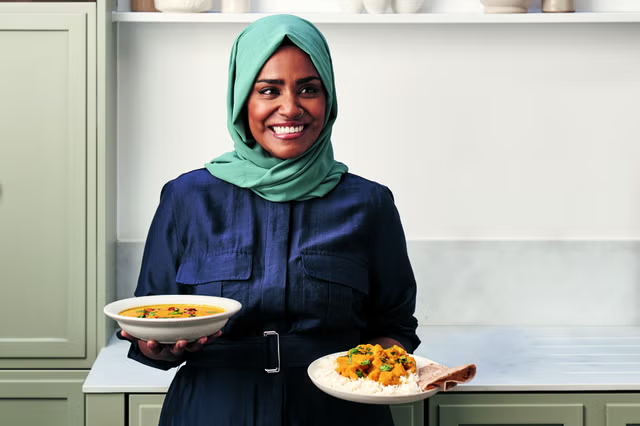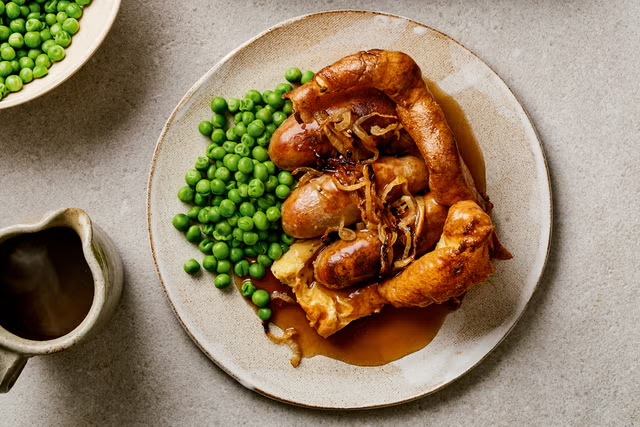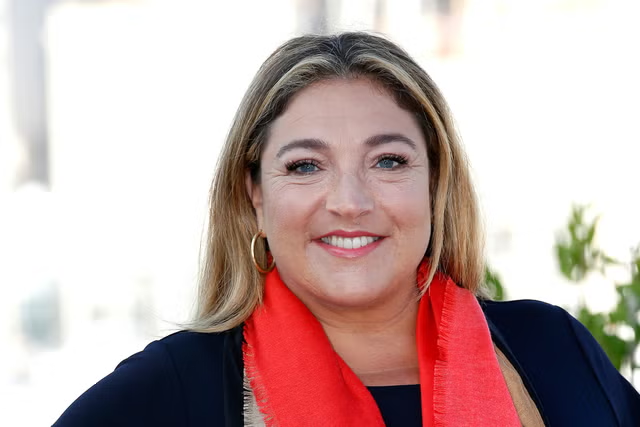
The name Ella Mills doesn’t tend to appear alongside the chefs and food writers regularly credited with changing the face of British food. She isn’t granted the “activist” label often given to Jamie Oliver or Henry Dimbleby; she wouldn’t get credit for overhauling our store cupboards like Ottolenghi.
It’s tempting to think it might be because she’s a woman. Or perhaps because she hails from the much maligned cohort of 2010s influencers who created the clean eating movement. But if you look in your cupboards, your handbag, or your children’s lunchboxes, the chances are you will find something direct from the Mills handbook.
A bag of dates and a jar of almond butter? A classic Millsian snack. The ingredients for a lentil bolognese? One of her most popular recipes. An apple and raisin oat bar tucked in your bag? A sure sign you are a fully paid up member of the Deliciously Ella club.
This week, twelve years after she first told us we should be eating more kale, Mills and her husband Matthew (son of the late MP Tessa Jowell, who died of a brain tumour in 2018) sold their company to Swiss food company Hero for an undisclosed sum. The couple, who were the majority shareholders, are expected to make millions of pounds from the deal.
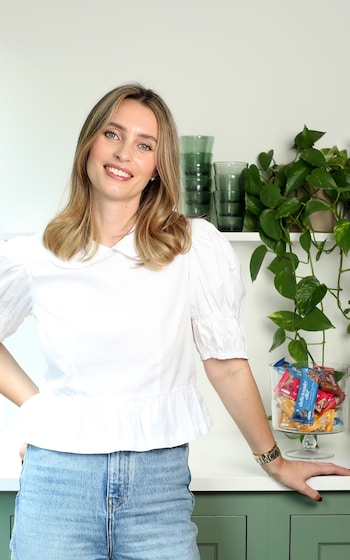
Since she first started blogging, back in 2012, about the plant based diet which had helped her heal after a bout of serious illness, Mills has ridden waves of negative press, brutal trolling and personal struggles. She’s also gone from being the beautiful, posh wellness girl to quietly changing the way we think about plants and ultra processed foods.
Her message (eat more vegetables, more of the time) stood the test of time, outliving innumerable faddy diets. So you could understand why she might feel she is owed her due after all this time. In fact, she’s too intent on doing something about the dire state of the nation’s health to be bothered about settling scores.
“We need this massive overhaul,” says Mills, when we meet in her office on Tottenham Court Road. “Kids in this country eat more ultra processed food than anywhere in Europe. One in five of us are getting 80 per cent of our calories from ultra processed foods [...] We are struggling so much with the way we eat.”
Our new Prime Minister’s plan to tackle Britain’s public health problem so far seems to amount to banning junk food adverts on television before the watershed and preventing children from buying high-caffeine energy drinks. For Mills, 33, who has two daughters aged five and four, it isn’t nearly ambitious enough. “It’s putting the smallest of plasters on the most gigantic of cuts. I don’t think it’s going to have anywhere near enough impact.”
Part of the problem, she says, is that we have “changed the way that we eat so fundamentally over the last 50 or 60 years. A quarter of us manage our five a day. The balance is so inverted. We need quite an extreme change to find balance, which is mostly eating fresh food, eating lots of fruits and vegetables.”
Addressing energy drinks “feels obvious. We’re going to have to go quite a lot further than trying not to give caffeinated drinks to children.”
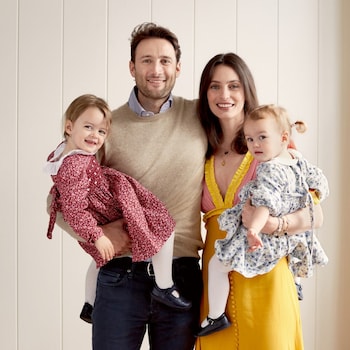
Previously, Mills would likely have stopped herself before expressing any contentious views in an interview. When we last met in 2020 it was in the depth of lockdown and she was pregnant with her second daughter, May (her first daughter, Skye, is named after her grandmother – the Scottish island was Jowell’s favourite place), running the business from her home near Hyde Park and baking sourdough.
She was friendly but a little guarded. Understandably so – back then, she admitted there had been a period in the midst of the clean eating backlash (Mills maintains the term “clean eating” has never appeared in her books) when she had been “too scared to have an opinion”.
When Mills first appeared on the scene, she was seen as a poster girl for wellness. She was 20 and had been diagnosed with postural tachycardia syndrome while at St Andrews university. Her nervous system was malfunctioning and she was struggling with chronic pain and fatigue. She began researching alternative therapies, overhauled her diet, cutting out gluten and refined sugar and going vegan. Slowly but surely she got better and began sharing her story online. In 2015, Deliciously Ella, her first plant-based book (you rarely hear her use the word “vegan”) became the fastest selling debut cookbook of all time, making her a household name.
She quickly became an easy target for critics who felt the wellness movement was to blame for a generation of girls suffering from disordered eating. Coupled with the “personal” attacks from faceless trolls, which she has recently said she found “violating”, she eventually felt the need to retreat. “I wanted to become essentially vanilla,” she told the Times earlier this year. “I found all the attacks a massive, massive adjustment. It was easier to be quiet.”
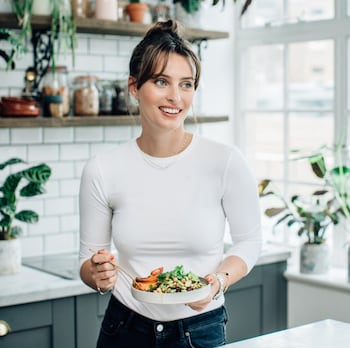
The brand has become “infinitely less personal over time”, she says. Now she prefers to limit how much she shares about her day to day life online. “That has been conscious and important to me.” Posts about healthy recipes and new energy ball releases have become the focus of the company’s social media feeds. “I didn’t want to be an influencer,” she says. “I didn’t want it to be about what I wear, how I live my life, my friends, my family.”
It’s why her face isn’t on the packaging and why you won’t catch her livestreaming her day. It doesn’t appear to have harmed the company. Recent Companies House records show the group’s revenues had grown to £24 million in 2023. They will sell 20 million oat bars this year - a Deliciously Ella product is sold every second. Her seven bestselling cookbooks are as successful as they ever were. Meanwhile the sale to Hero (whose roster includes organic baby food brand Organix) is set to give the brand the financial heft to launch beyond the UK.
They were always theoretically open to offers, Mills says, and the argument for doing it now is scale. “Unlocking all that international growth. Doing that with bigger backing allows us to do a lot more, a lot quicker,” she says. “We look at the community of people that engage with Deliciously Ella and only about a third of those people are in the UK.” It’s not a dissimilar sized audience in the US.” They are launching in Whole Foods in the States in November, and have their sights on Europe.
Mills and her husband will both stay on – he as chief executive, she as “founder/brand ambassador.” Their sister brand, Plants, which includes a range of pasta, kombucha, and a restaurant in Mayfair, is not part of the sale.
Today, Mills, wearing a white shirt, pale jeans and black boots, comes across as more confident than I remember her. She seems impressively relaxed for a woman who has just sold the company that is so connected to her name. She and Matthew (who began working alongside her as CEO almost as soon as they became a couple in 2015) have yet to celebrate, she says, admitting she has gone to bed early every night this week. She won’t tell me how much they sold the company for, but says there is “no plan to get a private plane and live on a tropical island”. “We’re not looking for a different life.”
Mills seems to have slowly grown into the role of businesswoman, but she finds it maddening how often she is still referred to as a “blogger”. “I don’t think there are any male businessmen who you would title by their first job,” she says. “I’m not sure at this point what I’ve got to do to be called an entrepreneur. We’ve sold 100 million products, we’ve got our own factory, we’re bestselling in every retailer across the country, we’re launching in the US, we’ve got 100 people in the business.”
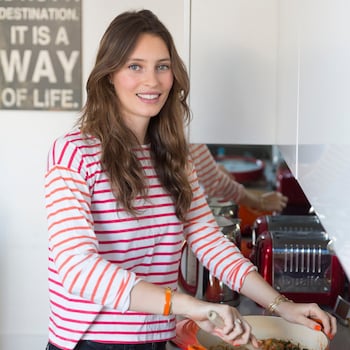
She is sceptical about what she calls the “glamorisation of the hashtag girl boss”, saying “the reality is it’s so incredibly relentless and I think you have to be willing for it to be your whole life”.
It was eye-opening, she says, during the sale process, when prospective buyers would address Matthew. “We’ve definitely had: ‘We’ll get a game of golf together’, and I’m like ‘Hey!’” she laughs.
We pass Matthew in the hallway. He admits to being tired after a “long few months” spent pushing the sale through. Mills later tells me she wishes his mum could have seen what he has achieved. “I think she’d be so proud of Matt.”
It’s lunchtime in the Deliciously Ella staff kitchen. Women in tasteful cardigans and athleisure heat up nourishing looking leftovers, or grab a bowl, a box of their branded muesli and a jar of their nut butter for an afternoon snack.
One wall bears the company tagline: “Helping people eat real food again with more plants, more of the time.” On another hang the magazine covers that Mills has featured on over the years. She might have sold the company, but it is still her name above the door. She doesn’t seem worried about the idea of relinquishing some control. “When you’re growing a business it is so relentless. And there is obviously an extraordinary amount of pressure that goes with that. Just having broader shoulders to share that pressure with, that’s really exciting on a personal level.”
There has been a good deal of sacrifice that has come with success. “It has been our whole life for nearly 12 and a half years, where it has to come first and foremost above everything apart from our children. The number of things that we’ve cancelled, things we’ve left early, been non-committal to, it’s an insurmountable list.”
Covid was a particularly rocky patch. “Lockdown after lockdown, into Brexit, into hyperinflation, there was a moment of ‘Oh my gosh, how many times can you be punched in the face?’ ”
The company went from having an “amazing culture” to having the way they worked “dismantled” by lockdowns. They operate a hybrid system now, with everyone working three days in the office and two at home, though Mills admits she is in every day (they have a nanny, but Mills does the school pick-up as often as possible).
“I can’t quite get my head around working from home. I like being around other people, I like the energy of it.”
The “magic” of a brand is “very hard to capture when you don’t spend time together”. “I think if we were starting today I would be keen to have us mostly together. When you want to create something and create momentum I think you really have to be ready to go.”
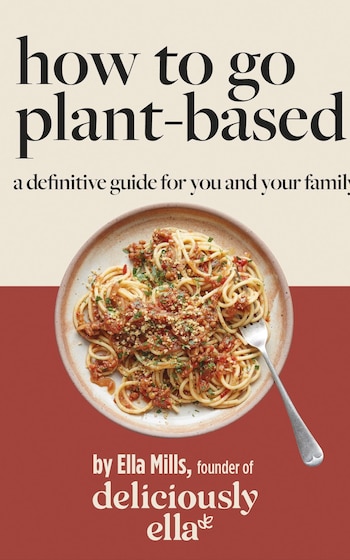
Post sale, Mills plans to be as present as ever, though she wants to claw back time with her young family. “It is also about trying to find a little bit more balance in life,” she says.
Balance is something of a buzzword for Mills. These days, she wants people to make small changes rather than overhaul their diet – a shift from the days when she was writing about having gone fully vegan. “I guess when I started, that was my journey,” she says. These days, her core audience (she has 2.4 million followers on Instagram) are mainly women in their 30s and 40s who have grown up with her. “If you ask them ‘Are you vegetarian? Are you plant-based?’ it’s pretty much all ‘I’m flexi’.”
She finds the rise in people relying on weight-loss drugs to control their health troubling. “We have created a food landscape that is so addictive, that’s so difficult to navigate, that’s created such an epidemic with people’s health that we now have to invent drugs that have some very negative side-effects potentially, in order to mitigate it.”
For Mills it shines a light on how drastically our eating habits have changed. Fifty years ago, she says, “we didn’t need that [drug]. It wasn’t necessary. Obviously for Type 2 diabetes, of course, but that was a much smaller proportion of people than it is today because of lifestyle-related challenges. The idea that young women are presenting in A&E having taken weight-loss drugs they don’t need is “just devastating”, she says.
She is raising her two daughters to love food and cooking, and often enrols them to help make dinner, but is conscious of not being too dogmatic. “I don’t want to be the parent saying no, you can never have this,” she says. “I don’t want them to have any complexes. I want them to go to the party and enjoy what’s at the party. But at home I want to teach them how to cook, I want to teach them about finding that balance, and I’d like them to eat their five a day most days.”
The one issue she feels strongly about is sweets. “When [Skye] was about two at nursery I was like ‘no I’m not happy for you on a Tuesday afternoon to have sweets’, and [I remember] that being seen as quite strange. I felt that was quite reflective of the world we live in.”
Mills grew up in Oxfordshire with older brother Thomas and younger sisters Olivia and Katherine. She is “really close” to her siblings and parents, the supermarket heiress Camilla Sainsbury and former Northern Ireland Secretary Shaun Woodward. It was her father who introduced her to Matthew in 2015 (they moved in together within weeks and were engaged four months later). Soon after they got together, her parents announced they were divorcing. Woodward went on to marry cameraman Luke Redgrave. “Complicated”, is the word she uses to describe the family set-up she came from. Is she trying to do things differently with her family? “Yeah, I think respectfully so. And we have a real unit which is amazing.”
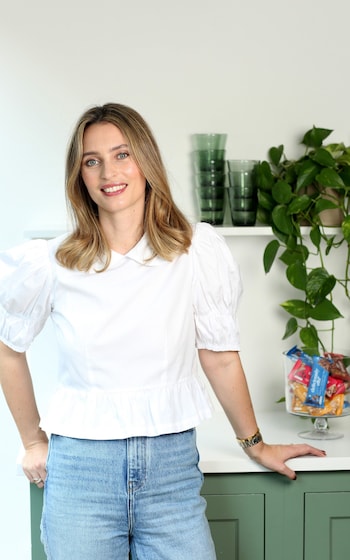
She drew a lot of inspiration from Matthew’s family. “I didn’t get to spend enough time with them as a four before Tessa died, I wish I’d had more time with them. But it was an extraordinary dynamic between the four of them, and I’d never met a family less complicated. No agendas, so unwaveringly supportive of each other.”
After her first daughter was born, Mills suffered a bad bout of postpartum anxiety. “I had really really really bad mental health,” she says. “It was this relentless fear and intrusive thoughts.” There is no trace of that shakiness today, though she still has “a sense of imposter syndrome”, and her self-esteem is a case of “ups and downs”.
She must take some pride in the fact that people are finally taking seriously the message she has been spreading for a decade. “When I look back on it I’m amazed at how controversial that seemed to so many people.”
A key point, she says, was after her second daughter was born when home life was extremely demanding and the business needed galvanising. She thought: “Well, if I’m going to throw everything into my work I want it to mean something and I want it to have an impact.”
Mills doesn’t claim to be “the sole solution for changing the way the country eats. But I think I can play a role in it, and I think I have played a role in it.” She is clear she doesn’t want to shy away from speaking her mind simply because “some people don’t like the way that I say it or like me”.
“No one gets everything right and I’ve not got everything right by any means,” she says. “But I know that we’ve had a massive impact on millions of people, changing the way that they eat for the better.”
Her girls love what she and Matthew do. “They’re obsessed with the cookbooks, and they’re, like, can we do another one? They want to be a part of it and that’s great.” She is excited about what is to come both with Deliciously Ella and Plants. “I have a feeling we’ll build many businesses in our lifetime,” she says of her partnership with Matthew.
I wonder if, these days, she gets much of the old flak that used to be flung her way? “Not really because I think everyone has come round,” she says. “It’s quite hard to now argue that eating more vegetables is a bad idea.”
Disclaimer: The copyright of this article belongs to the original author. Reposting this article is solely for the purpose of information dissemination and does not constitute any investment advice. If there is any infringement, please contact us immediately. We will make corrections or deletions as necessary. Thank you.
